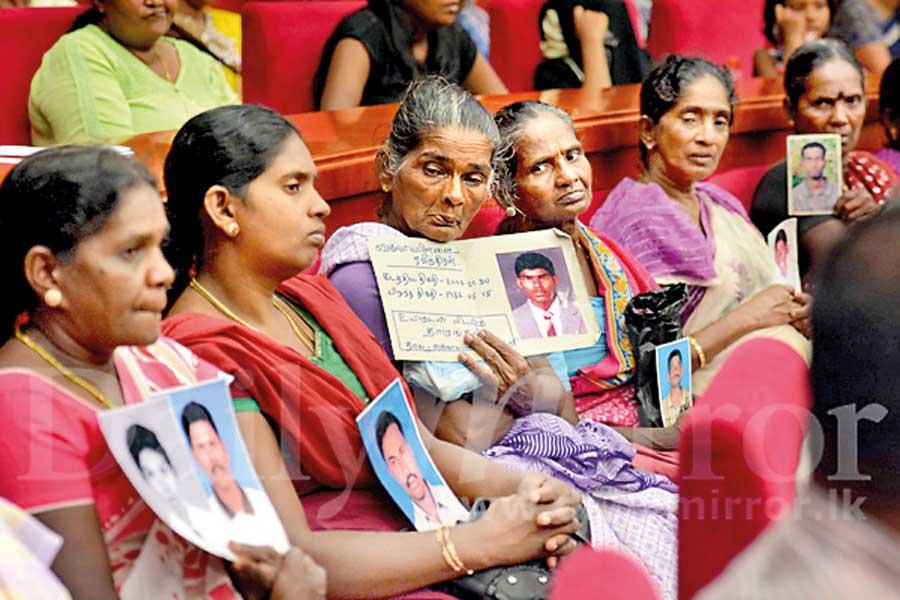10 Jan 2024 - {{hitsCtrl.values.hits}}

National reconciliation needs to be a voluntary process involving all ethnic and religious communities. There is a need to draw civil society and elected political representatives into the discussion. This week, the government will be taking up the ONUR bill for debate after which it will be enacted as law.
It is proposed that appointments to the ONUR board should include ex-officio representatives from the Office of Missing Persons, Office of Reparations, NGO Secretariat and the Truth, Unity and Reconciliation Commission which is soon to be established.
In a statement issued, several civil society organizations have stressed on several concerns with regards to the bill on the Office for National Unity and Reconciliation (ONUR). This week, the government will be taking up the ONUR bill for debate after which it will be enacted as law. The bill proposes to establish an Office for National Unity and Reconciliation in order to assure every citizen equal opportunities in the economic, social, cultural and political spheres. At the same time, the new institution will have the purpose of safeguarding identity and building an inclusive society in which diversity will be respected and all communities will coexist in harmony and unity.
The commendable objectives outlined in the ONUR bill, such as promoting national unity and peaceful coexistence, require dialogue and negotiation among representatives of diverse communities in Sri Lanka, both in civil and political societies. Unfortunately, the potential importance of this new institution appears to be under-estimated by the government, its policymakers and the law’s drafters as there has been little or no effort to engage in public discussion on it or to educate the general public about the need for it.
We, the undersigned, have three major concerns which we outline.
Firstly, we believe that the composition of the decision making board of the ONUR will be crucial to the success of the institution and its work. We note that appointments to the ONUR Board would be made by the Minister under whose purview the institution comes. The Minister is empowered to recommend the appointment of eleven members who will have terms of three years, while the chairperson has no time limit, which is inadvisable. We urge a more multi-partisan method of appointments to ensure that those appointed represent the diversity of ethnic and religious groups and socio-cultural interests.
Secondly, as the ONUR is expected to play a central role in the national reconciliation process that brings together all the independent reconciliation mechanisms we propose that appointments to the ONUR board should include ex-officio representatives from the Office of Missing Persons, Office of Reparations, NGO Secretariat and the Truth, Unity and Reconciliation Commission which is soon to be established. This will ensure that all the reconciliation institutions share a common vision and are informed of the work that is being done by each of them. There is also a need to ensure representation from civil society to ensure that the perspectives of affected communities and victims are considered and acted upon.
Thirdly, we are concerned about the role given to the ONUR to be prescriptive vis-a-vis civil society by virtue of the power “to guide and facilitate peace and reconciliation programmes conducted by local organisations including community based organisations.” This authority to monitor and review the work of civil society raises concerns about the prospect of government heavy-handedness in the context of the possible politicization for narrow and partisan purposes of national reconciliation policy and actions. The new law needs to be clear that the government will not direct civil society to follow its guidelines, but can “assist and facilitate” them to do so.
National reconciliation cannot be enforced from top to down. It needs to be a voluntary process involving all ethnic and religious communities. There is a need to draw civil society and elected political representatives into the discussion about the new institution. Prior to the passage of the new law, we urge the government to engage with opposition political parties, particularly those representing minority ethnic and religious communities, as well as the civil society, to establish a multi-partisan consensus, encompassing pluralistic values on the path to make this a true reconciliation process for national unity.
06 Jan 2025 1 hours ago
06 Jan 2025 2 hours ago
06 Jan 2025 2 hours ago
06 Jan 2025 2 hours ago
06 Jan 2025 2 hours ago